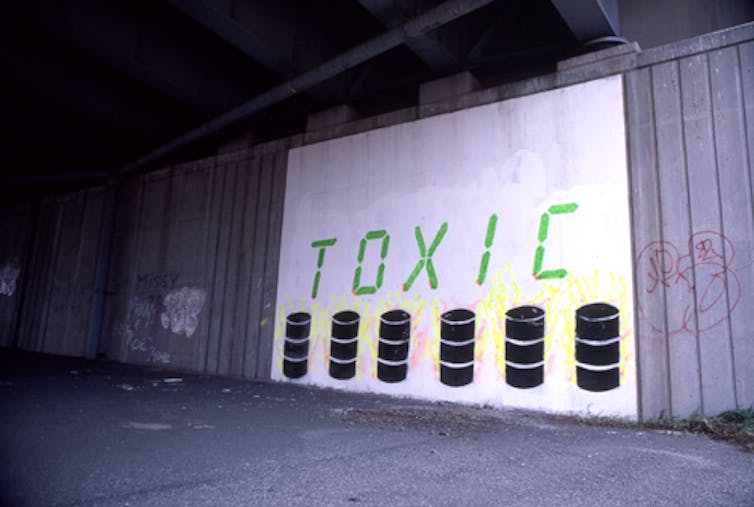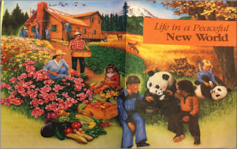The story of America, as told through diet books

“The South Beach Diet” sold 23 million diet books. Dr. Atkins sold another 15 million. Even lesser-known diet books like Christian best-sellers “The Maker’s Diet” regularly sell millions of copies.
This isn’t a new trend. The 1918 diet book “Diet and Health: With Key to the Calories” sold two million copies by 1940 and was published in more than 55 editions. Combined, just these few series could fill every shelf in the Library of Congress and still have a copy left over for every American public library.
Why do we find the stories told by diet books so persuasive? What is it about this near-impossible quest that’s seduced reader after reader over the last century?
Diet books provide the narrative key – not only to our 20th century Western obsession with weight loss, but our culture as a whole. If culture, as anthropologist Clifford Geertz once put it, is made up of the “stories we tell ourselves about ourselves,” then diet books are troves of these stories, at once wildly democratic and deeply intimate.
I’ve spent the last five years reading hundreds of diet books. As I explain in my upcoming book, “Diet and the Disease of Civilization,” diet books and nutritional advice offer needed insights into the philosophical debate in America about who we are and how we should live.
The disease of civilization
In an echo of Genesis, diet books recount an earlier, Edenic paradise of health. They narrate our fall from grace, then exhort dieters to reform their lifestyles and return to that earlier ideal. They pathologize the relationship between human health and modernity by insisting that we should return to a more “natural” lifestyle.
Take the paleo diet. This diet holds up an original Paleolithic paradise as an ideal world, characterized by social equality, effortless health and natural beauty. Today’s world looks grim by comparison.
The paleo diet implies that agriculture brought about mankind’s fall from grace, ripping Paleolithic peoples from their state of nature and introducing civil society and all of its many problems. It promises its three million American followers a chance to recover some of that original world.

Devotional diets offer the most obvious example of a fallen society. Christian weight loss plans like the Eden Diet fold the spirit into the larger claim of the diet genre on the whole: namely, that Americans today are fat, sick and sad because our world is out of whack. These books suggest that Western civilization denies human nature and that disease is the inevitable cost of modern life.
All of these stories combine to create a powerful critique of modernity. Our Puritan forefathers decried Americans for failures of spirit. Our diet gurus today rage that our bodies are ill and our willpower weak. Both insist that only individual reform – of spirit or of body – would rescue the health of the body politic.
The ‘toxins’ of modern life
In an elegant story of a pure, preindustrial world, detox diets push for a cleaner body and a cleaner environment.
Published since the 1980s, detox diets blame pollution, contamination and the general toxicity of modern life for the rise of obesity and other noncommunicable diseases. These diets include food addiction in the broader drug and alcohol addiction framework.
Detox diets helped introduced “toxicity” as a metaphor in public discussions about food, addiction and obesity in the U.S. Today, obesity prevention researchers and alternative food activists blame a “toxic food environment” for food addiction and rising obesity rates.
This concept mediates between conservative arguments for personal responsibility and liberal beliefs in government intervention. Toxicity is the middleman in the relationship between environment and citizen.
Few detox diets pinpoint actual toxic substances like mercury in tuna or specific preservatives in processed foods. Instead, toxic foods or a toxic society are easy scapegoats in a world so tragically saturated with material toxins like DDT. For dieters, “toxins” are nearly always vague shorthand for all that is wrong with American culture, politics and people.
1984’s “Detox” opened with a sentence typical of the genre: “It is now a fact that harmful substances are everywhere: in the air we breathe, the water we drink, the fresh vegetables we eat, and the clothes we wear. The environment, once so familiar and trustworthy, is becoming a stranger as toxic chemicals permeate our atmosphere, lakes, oceans, and soil.” The book advised Americans to detoxify their diets and protect themselves from pollution with masks and filters.
Purify your body… and clean up the world
Many diet books straddle the political line between diet and manifesto. Rather than accept environmental damage as irrevocable, these books often urge dieters to vote for environmentalist candidates, support organizations like the Sierra Club or, at the very least, practice consumer activism.
In 1971, food activist Frances Lappé’s best-selling “Diet for a Small Planet” was at once a political blueprint for a better world and a meal-by-meal diet. Lappé championed environmental vegetarianism and railed against industrial agriculture in the path-breaking book, which has since sold three million copies.

In a way, detox diets use selfishness as a springboard. They rally self-concerned readers not simply to improve their own lives, but to save the world. By “voting with your fork,” alternative food activists use consumer dollars to promote a vision of whole foods, real small-scale farms and a diverse bounty of unprocessed produce.
This naive, wistful vision has the power to create activists from cynics: Think of the continued relevance of the 1984 “Detox” promise that “By the year 2000, we should all be breathing cleaner air, eating unprocessed and uncontaminated foods, and drinking water that is fit to drink.”
A vision for the future
Many diets today respond to anxiety over the coldness of modern life by romanticizing a pioneer past, built on the concept of the agrarian democracy advocated by Thomas Jefferson. This kind of Jeffersonian republicanism advocated for a nation of independent yeoman farmers insulated from city corruption, deeply invested in American soil and, in turn, the American endeavor.
But they also relay more radical food politics into an easy-to-understand set of food philosophies that issue a call to action. They call on us to detoxify our bodies and our nation, curing the sickness of both body and body politic.
![]() These books tell the story of a people who – despite the sometimes unending tragedies of modern life – reject the world-weariness that plagues our cynics and depresses our idealists. Dieters plod along: They are optimists who recognize the hungry, difficult work of everyday life, but still plan to recapture a lost world, perhaps even better than it was before.
These books tell the story of a people who – despite the sometimes unending tragedies of modern life – reject the world-weariness that plagues our cynics and depresses our idealists. Dieters plod along: They are optimists who recognize the hungry, difficult work of everyday life, but still plan to recapture a lost world, perhaps even better than it was before.